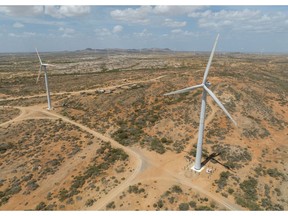Colombia is rushing to strike a deal with the US that will unlock the first cash for a $40 billion climate investment plan before Donald Trump takes office. If that push fails, China could be an option.

Content of the article
(Bloomberg) — Colombia is rushing to strike a deal with the U.S. that would unlock the first cash for a $40 billion climate investment plan before Donald Trump takes office. If that push fails, China could be an option.
Susana Muhamad, Colombia’s climate minister, said she will go to Washington in a few weeks to try and secure initial financing for an ambitious strategy to overhaul her country’s fossil fuel-based economy for green investment. Prospects for a deal are more complicated now that Trump won this month’s election, he said.
Advertising 2
Content of the article
It is a race against time for the package, which mimics the Just Energy Transition Partnerships (JETPs) that have been signed between rich and developing countries, with the aim of accelerating the transition from fossil fuels. Colombia is seeking $10 billion from international financial institutions and developed countries. The move could set a template for other countries looking to move away from fossil fuels.
Colombia’s investment plan is aimed at replacing fossil fuel export revenues that are expected to decline after the country halted new oil and gas exploration two years ago. The country will look for other financial sources – including from China – if the talks in the US fail, according to Muhamad. President Gustavo Petro has made climate transition a central pillar of his government.
“If we can’t close the current deal for Colombia in the next six months, it’s likely that the plan will remain dependent on the next election and then there will be uncertainty,” he said in an interview at the COP29 climate summit. Colombia has elections in 2026. “President Petro asked us to start talking with China. Colombia will look north, south, east and west.
Content of the article
Advertising 3
Content of the article
Colombia is just one of the countries currently scrambling to lock in climate commitments from the US in the two months before Trump takes office. At the Organization for Economic Co-operation and Development, the Biden administration made the final push for an international agreement limiting export-credit agency financing of foreign oil and gas projects, supporting an initial proposal made by the European Union.
It is also unclear how Trump sees the role of the US in the various multilateral development banks in which he is one of the main shareholders, such as the Inter-American Development Bank, which manages Colombia’s climate finance plan. The US played an informal role as the main coordinator.
All this has fueled fears that climate finance is starting to dry up. Negotiators in Baku are trying to reach an agreement at COP29 to increase the amount of funding the rich world provides to poor countries to help transition and protect their economies from the effects of climate change. Developing countries say rich countries have been slow to deliver on past funding pledges.
Advertising 4
Content of the article
While some countries have JETP programs in the billions of dollars, the system designed to provide a financing model for the future has been beset by delays and political turmoil. Colombia’s plan is seen as one example of how the process can be improved, especially by the recipient countries that explain the precise need for investors to have a clear project to give money to. Other countries, such as the Philippines, are also considering a similar investor-friendly approach.
Colombia is among 13 countries that have ratified the Fossil Fuel Nonproliferation Treaty, which calls for an end to the expansion of new fossil fuel projects – something scientists say is necessary to meet global climate goals.
However, the country is taking a risk and its failure will send a clear signal to other fossil fuel producing countries that want to speed up the green transition.
Colombia’s economy has been struggling after investment fell sharply in the sector last year and gross domestic product grew by less than 1%.
“We are making high stakes,” Muhamad said. “This change in politics can create delays and hinder the process.”
—With assistance from Jennifer A. Dlouhy.
Content of the article




